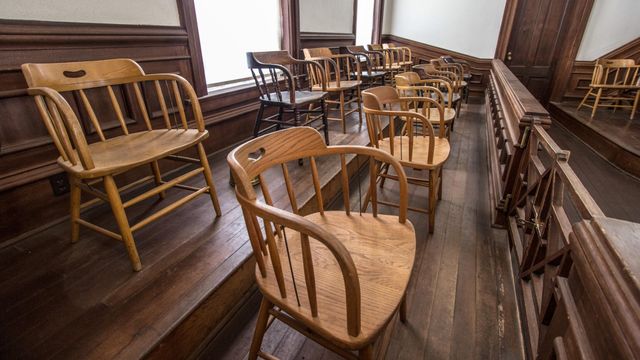Wake death penalty case raises questions about jury selection
Should the jury selection process for death penalty cases in North Carolina be different than non-capital murder cases?
Posted — UpdatedIt's a question up for debate among prosecutors acting on behalf of the public and victims, defense attorneys working to be sure their clients get fair trials and judges charged with the task of administering justice fairly and efficiently.
In Wake County Superior Court on Thursday, defense attorneys for Armond Devega, a Raleigh man possibly facing the death penalty for two shooting deaths in 2008, asked a judge to allow potential jurors to be questioned individually when the case goes to trial, currently scheduled for Sept. 4.
Usually in jury selection – a process called voir dire – attorneys and judges interview jurors in groups of 12.
Superior Court Judge Paul Gessner denied the defense motion, saying that the circumstances of the case didn't warrant a special jury selection method.
Jurors in Wake County's most recent capital murder trial – the case involving the death of North Carolina Board of Education member Kathy Taft – were questioned individually, and voir dire took more than five weeks. The case had been covered extensively in the media and dealt with sensitive subject matter involving details of the defendant's past.
The current case hasn't had the same public exposure, Gessner said, and he is concerned that questioning jurors individually would be inefficient, time-consuming and costly.
"This has been a long-standing concern I've had about what's the most effective and efficient way to administer justice," he said during Thursday's pre-trial hearing.
Wake County District Attorney Colon Willoughby, who oversees the prosecution of every case but isn’t directly involved in Devega’s, agrees with Gessner, saying that streamlining jury selection is a way to cut the cost of death penalty cases.
"I think, unless there's some overriding reason to individually question people, we ought to be questioning people in groups of 12," Willoughby said. "I mean, it's much more efficient. It saves time. It saves money. There really aren't any issues that matter (in regard to jury selection) in most cases."
Devega's defense attorney, Terry Alford, however, raised concerns in court why the prosecutors don't reach plea deals for life imprisonment if the state is concerned about the cost and time of capital murder cases.
"We should be very selective in the cases that we try," Willoughby said. "That's what the prosecutors in this state are doing. We only try 10, 12, 15, 20 death penalty cases a year out of 600 or 800 homicides (statewide) a year."
Local defense attorney Karl Knudsen, who is also not involved in Devega's case, said individual voir dire helps protect defendants' rights and is much more beneficial for the defense in death penalty cases.
"It allows for a freer exchange of information. It allows a person, in my opinion, to more accurately tell you what their opinions really are," Knudsen said. "Also, as the process goes on, it gives you more opportunity to judge what your jury is looking like, what's likely to be coming up … and it allows both sides to have a better opportunity to pick a jury."
"But the expense, in terms of time and money, may, in some people's minds, offset that," he added.
Defense attorneys say the best way to cut costs is to make plea deals or eliminate the death penalty.
"It's never made sense, financially. The cost of fully litigating a capital case over the average 10 or 15 year life span of the case … far outweighs, in my opinion, the benefit to society," Knudsen said. "I mean, if you can lock someone up – and they're going to die in prison anyway – why do we want to spend $1 million or more trying to set an artificial date as to when that happens?"
Willoughby, however, says he believes group voir dire can be fair in death penalty cases.
"I don't think people are embarrassed about their views, whether they're supportive or against the death penalty," he said. "I think, either way, people are fairly comfortable in talking about that."
Devega is charged with two counts of murder, one count of attempted murder and nine counts of robbery in a series of robberies between January and October 2008.
Investigators say he shot and killed Anthony Dwayne Scarborough, 32, on Feb. 13, 2008, and Stephanie Powell Anderson, 39, on April 10, 2008, and injured Modesta Fernandez Lucas on Sept. 10, 2008.
Authorities have said that Devega and Scarborough knew each other while they were imprisoned at the Johnston Correctional Center and that Devega might have held a grudge against Scarborough.
Anderson, a store clerk at a Wilco-Hess gas station on Trawick Road in Raleigh, was ambushed as she arrived at work and was shot when she was unable to open the store’s safe, investigators have said.
Fernandez-Lucas, a clerk at the last robbery location, was shot several times but survived.
• Credits
Copyright 2024 by Capitol Broadcasting Company. All rights reserved. This material may not be published, broadcast, rewritten or redistributed.






